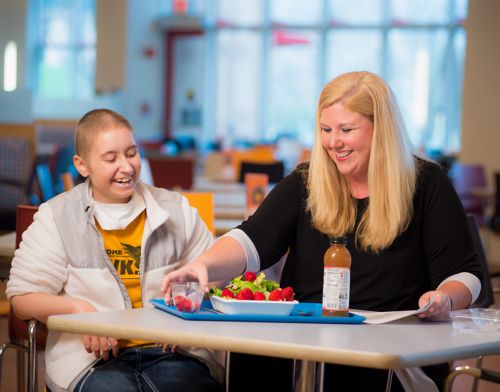Menu
Close
Back
Welcome to
Together is a new resource for anyone affected by pediatric cancer - patients and their parents, family members, and friends.
Learn MoreNutrition is a special concern for children living with cancer or other serious illness. The main goals of nutrition care are to help children grow and do their normal activities. Good nutrition can help prevent problems such as illness, weight loss or weight gain, and fatigue. Nutrition care can help with side effects and other issues that occur during disease treatment. Nutrition care can also help children and families build healthy eating habits.

Doctors often refer patients for nutrition assessment or nutrition therapy during illness and recovery.
Nutrition support gives children who cannot eat or digest normally with the nutrients they need to grow and be active. Cancer or other illness can prevent children from eating the foods they need for good health. Some treatments can change the way foods taste. Children may feel nauseous, lose their appetite, or have trouble swallowing.
While it is best to eat and drink by mouth, patients who cannot eat may need nutrition support. Nutrition support includes enteral nutrition (tube feeding) and parenteral nutrition (IV nutrition).
Vitamins and minerals are important for normal growth and development. When your child is not eating or drinking well, it is tempting to add a vitamin or nutrition supplement to help them get nutrients. However, supplements are generally not recommended unless there is a health need. Certain vitamins, minerals, and herbs can keep some medicines from working correctly. Some nutrition products can even be harmful. Products labelled whole food, natural, healthy, pure, or organic, are not always safe or helpful.
Discuss the following products with your care team:
Your dietitian can help make sure your child gets the nutrients they need.
Nutrition professionals — also known as nutritionists, dietitians, registered dietitians (RDs), or registered dietitian nutritionists (RDNs) — are important members of the care team. Dietitians have special training in different areas of nutrition. They can help with healthy eating habits, special diets and nutrition for illnesses, and therapies for children who cannot get enough nutrients from foods.
Specific services of a clinical dietitian include:
Medical Nutrition Therapy or Clinical Nutrition is offered in a variety of settings including hospitals and clinics. For children with cancer or other illness, nutrition assessment and therapy can help patients and families manage:
Most nutrition professionals in health care settings are Registered Dietitians (RDs) or Registered Dietitian Nutritionists (RDNs). They have education and training in nutrition and patient care. Registered dietitians have also passed a national exam. Some dietitians have certifications in specialty areas, such as in pediatrics (CSP) or oncology (CSO). Many states require licenses for nutrition professionals (CDN, LDN). Your doctor can refer you to a dietitian who works with children.
—
Reviewed: September 2022